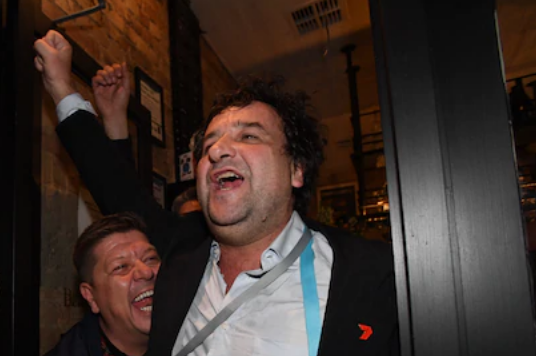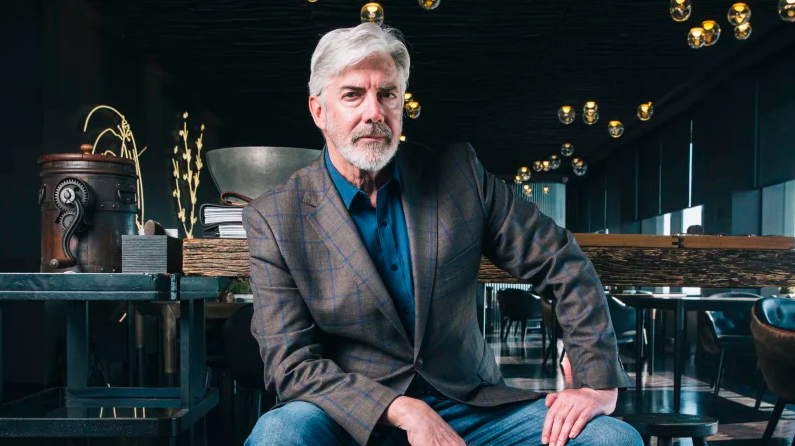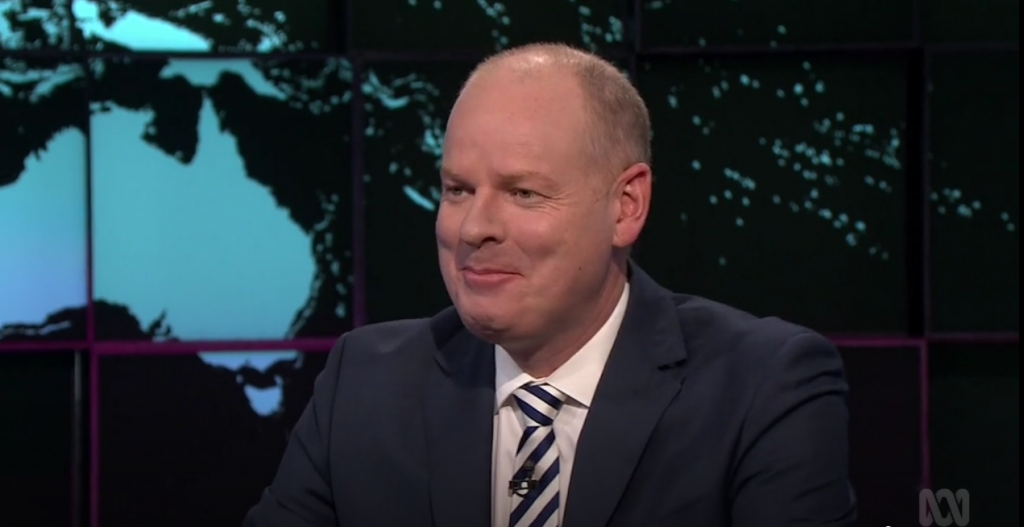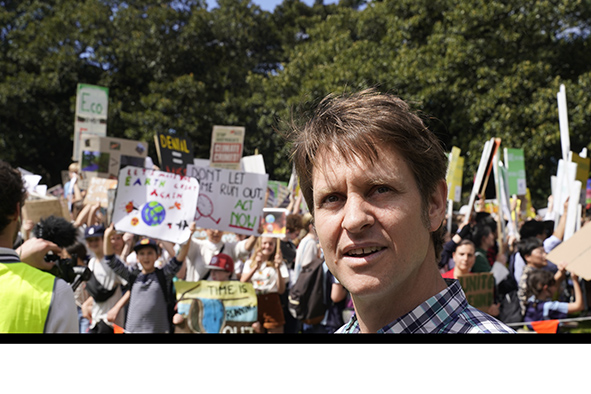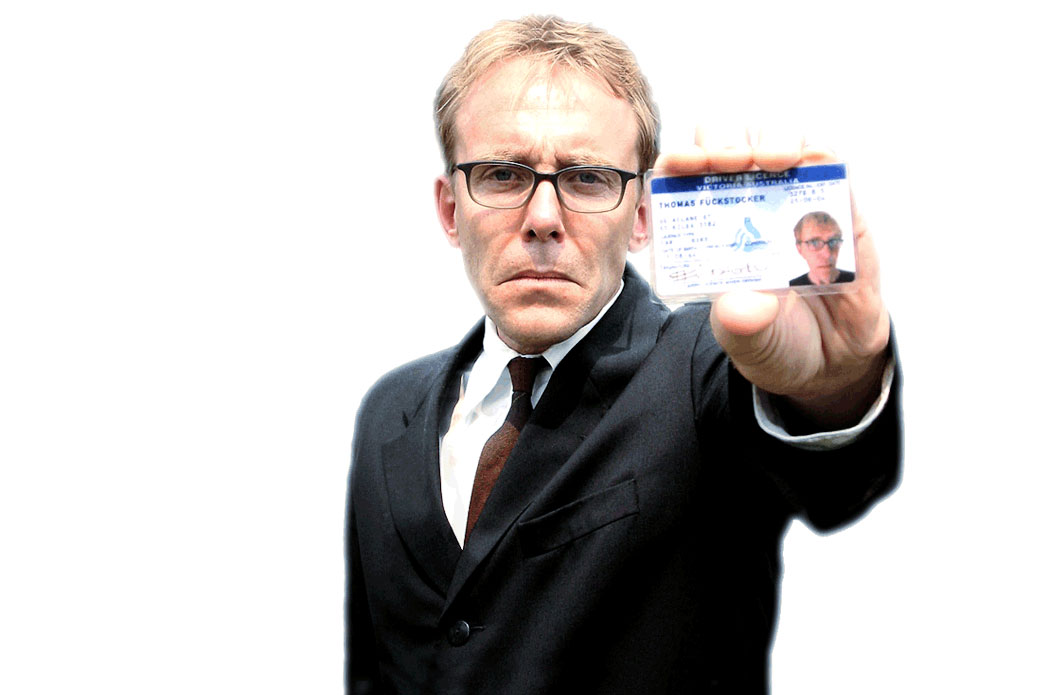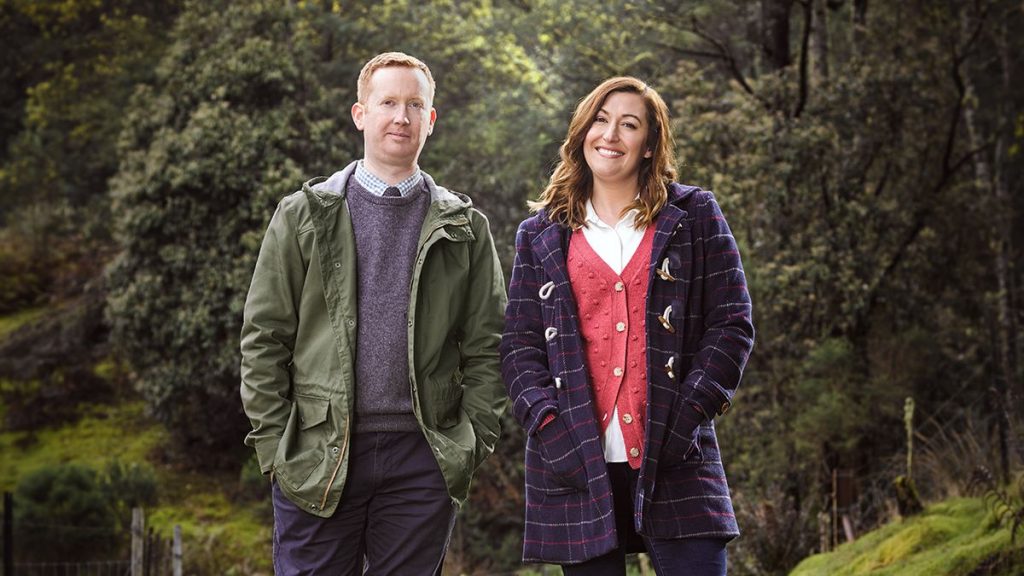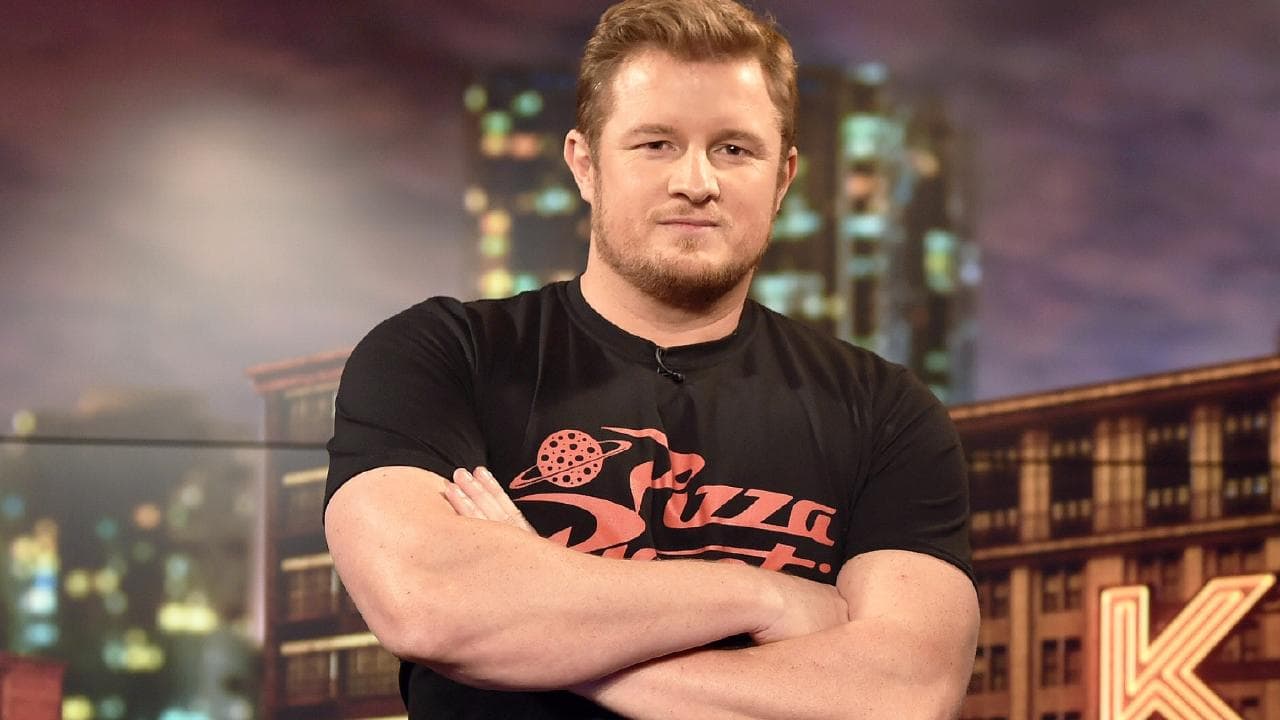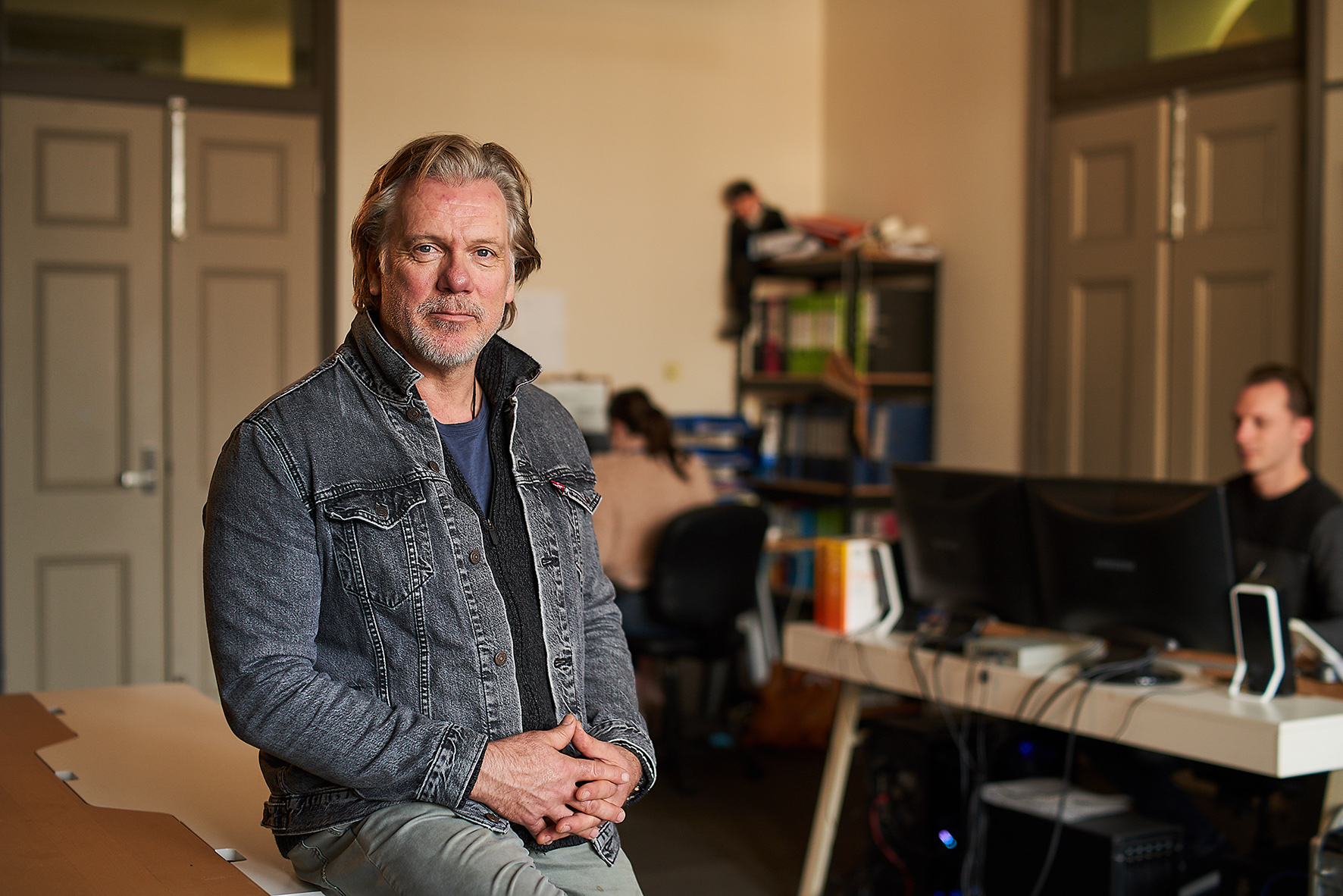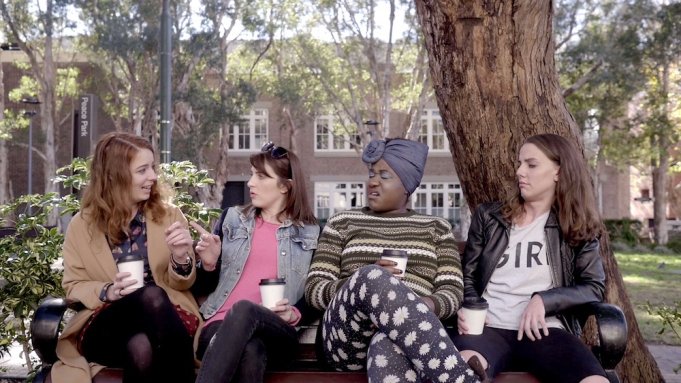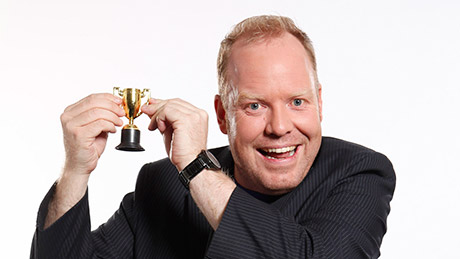Australian Tumbleweeds
Shaun Micallef Hits the Piss
If the ABC really wanted to pull a crowd with Shaun Micallef’s On The Sauce, they should have got Mick Molloy to host it. Having Micallef host a mildly anxious series about how maybe drinking is not great for everyone just feels like a natural fit: having Molloy out there desperately trying to fit his boozy persona into the ABC’s sober agenda would have given this series a spark that – it pains us to say – it really needs.
Those expecting Micallef in comedy mode would have been sorely disappointed by tonight’s episode, but comedy was never really on the agenda. This was always going to be yet another serious series where a comedian investigates a topic of personal interest in a mildly informative manner – in this case, Micallef needs to find a way to try and persuade his teenage sons to follow in his footsteps and stay off the grog, only with them skipping the handful of years where Micallef was a youthful tearaway sculling bottles of scotch and passing out outside bars.
While this initially presents itself as Micallef investigating the world of alcohol – a world he’s avoided for the last 30 years – so he can become an informed guide for his kids, you don’t have to look too deeply to see that this was only ever going to play out one way: hey kids, booze is bad. Which does tend to cut off the few comedic possibilities this series might have had, because the only way to scare people off booze is by taking booze extremely seriously. Fans of comedy vomiting and “youze are my bestest mates evaaa”, look away now.
So when Micallef goes to hang out with people who actually do drink, they’re always treated with a kind of bland arms-length respect. Micallef himself (who is out of his comfort zone more than once here) often seems a little awkward around them – possibly because, in this context at least, he has nothing in common with them – and their drinking is presented in a kind of “not for me but fair enough” fashion that rarely provides any real insight. A harsher show could have found a lot of mean-spirited comedy here, but (thankfully?) this is above that.
One thing that is interesting (and which ties in with the general anti-booze tone of it all) is that while the people who drink are treated with respect, the only reasons ever given for wanting to drink are social ones – peer pressure, making friends, being part of the group and so on. The idea that anyone might like to drink because they enjoy the effects of alcohol is barely touched upon (and then only extremely clinically) presumably because if you want to argue that drinking is bad then having it actually be pleasurable makes that a lot harder to do. But if drinking is purely a social thing, then it’s perfectly reasonable to replace it with sober social activities and get rid of the booze entirely – please sign our petition to make Australia a dry continent, thanks.
There’s also a weird sense here that drinking is somehow largely (entirely?) a cultural thing. The reason why Australians drink is presented as the result of the way Australian society is set up (farmers need to bond quickly with strangers, immigrants need a quick path to blending in, sport is linked to booze through advertising, we’ve always been a nation of pissheads, and so on), and not because of any personal desires – well, not any good ones at least, as the dark side of drinking is most definitely covered here too. Which means that if we could only change Australian culture, then Australia’s drinking problem would go away. Please sign our petition, etc etc.
(the fact that Australian drinking rates are in decline and have been for decades gets a very brief mention)
This opens a big door labelled “problematic”, because whose culture are we talking about here? Micallef is a clear outsider when it comes to boozing whatever the context, but for much of this first episode the people who drink are very obviously very much unlike him – mostly young people, often rough around the edges in a way that suggests they’re probably not big ABC viewers. This may just be accidental; on the other hand, everyone here is pretty white (at least until episode three, when the impact of alcohol on indigenous communities is supposedly going to be looked at), which suggests someone somewhere thought about what kind of Australia was going to be put under the microscope here.
It’s not quite getting into us versus them territory (and next week promises a visit to a boozy book club, which is about as ABC an activity as you can get), but there is the occasional sense here that drinking is really only something that other people do and maybe they need to be told to stop… you know, for their own good. Which is pretty much how the “alcohol debate” currently works in this country, so no big surprise there.
Well, maybe a little one if you were expecting something with a bit more genuine inquiry underlying things. But it’s clear that Micallef himself is no fan of the grog (and for good reason going by a couple of personal stories), and if the summaries of future episodes are any guide this three part series ends up as more of a “how do we stop people drinking?” show than anything else. You have been warned.
On the upside, how about those early Micallef clips, huh? Theatresports! The ABC had an entire channel named ABC Comedy and they never got around to repeating that. It’s enough to drive you to drink.
Vale Hard Chat
It was a shit segment and it should have ended four years ago. Good fucking riddance.
(is that going to be it? – ed)
Okay, fine. Usually we at least try to get in somewhat early with our so-called “news coverage”, but when we heard that Tom Gleeson was finally retiring his excreteable Hard Chat segment from The Weekly a good 80 episodes after it stopped being funny, we thought “hang on, let’s wait a minute here”. No point digging a perfectly good hole when we’re not 100% sure the fucker’s dead yet and all that.
After all, our only source for this information was Tom Gleeson, a performer who’s carefully developed over the last decade or so a subtle and nuanced comedy persona that’s best described as a lying sack of shit. Oh wait, we mean “colourful prankster” who just happens to say whatever the hell he likes so long as there’s a bit of publicity in it for him. Because it’s funny! To him at least.
So claiming his long-running segment had finally staggered to an ignoble end only to exhume the corpse in a week or so’s time is totally in keeping with whatever the fuck kind of comedy character he’s supposed to be playing these days.
“That’s the joke” his fans say, “he’s pretending to be a self-obsessed jerk who’ll insult anyone for attention! He also tells lies! Hilarious!” and no doubt in the hands of a skilled comedy practitioner – or even with a bit of context around it, as Gleeson sometimes provides during his actual comedy performances and on quiz show Hard Quiz – this kind of act works just fine. Well, probably not “fine”, but you can see what he’s trying to get at.
But the whole point of the increasingly pointless Hard Chat was that Gleeson was a loose cannon willing to talk shit to anyone anywhere, and that eventually spread out into the real world with things like his efforts at The Logies. Which again, wasn’t automatically a bad thing, except that unlike other professional bullshit artists around the globe there was no real comedy character – or joke – behind it. Gleeson wasn’t pretending he’d axed his show and it wasn’t coming back unless he won the Gold Logie to make any kind of greater comedy point, or even just to get laughs; he did it because he wanted to win a Gold Logie.
And now he has one. There’s even a reasonable chance he has the final one: TV Week just got bought by an asset-stripping venture capital firm almost certainly looking to cash in then cash out, and wasting money on an awards night that hands out statues to the likes of Tom Gleeson isn’t going to look good on the balance sheet. There’s a high note to go out on.
Hard Chat wasn’t just a one-joke segment that relied almost entirely on the quality of the guests involved and stopped being funny three weeks in: it took Tom Gleeson from rarely amusing comedy dickhead to the dizzying heights of award-winning quiz show host. Which means it took him from being the Ginger Ninja to somebody we can pretty much ignore, which is a win-win all around.
Mind you, it was still a shit segment that should have ended four years ago. Good fucking riddance.
This Is Planet A
Press release time!
Presenter, prankster and positive planet-promoter, Craig Reucassel returns to Tuesday nights on ABC to once again inspire our thinking and challenge our behaviour, in the must-watch series Fight for Planet A: Our Climate Challenge.
[guess social distancing is over – coming soon, Craig Reucassel: Superspreader]Premiering Tuesday 11th August at 8.30pm, over three episodes, Craig takes on a climate challenge to reduce our carbon emissions and understand where our energy comes from, how transport and travel emissions affect our health and just what is the carbon footprint of the things we eat?
Craig says: “I can’t wait to share this series with everyone. The bushfires and COVID-19 pandemic have seen a depressing start to 2020. While the effects of climate change remain one of our planet’s biggest issues, it’s an area where we can hopefully find some more optimism. There are so many things we can do right now to reduce our individual and communities carbon emissions – we just need to make a start. I hope all Australians will join me in the Fight for Planet A.”
Fight for Planet A will entertain, inform and challenge our thoughts on climate change. Craig will showcase how individuals, families, schools and businesses can help reduce our carbon footprint by making practical day-to-day changes, especially in our homes. We’ll meet five very different Aussie households, who will take on Craig’s “climate challenge” to reduce their energy, transport and food carbon emissions.
Far from taking the pressure off businesses, Craig will check in to see if they are doing all they can to make the changes we need and challenge them to do better. He’ll question our politicians and meet some inspiring Australians who are working toward solutions for the future of our planet.
Small actions can lead to big changes and we can all play a part, so it’s time for Australians to collectively change the way we think about climate change and join the Fight for Planet A.
Prankster? Still? Guess Reucassel did do a short skit on At Home Alone Together.
On the other, more realistic hand, we really shouldn’t be surprised that the ABC’s grim determination to make worthy educational television seem entertaining by putting a comedy face out front continues apace. First Shaun Micallef, now this; if Chris Lilley hadn’t been cancelled Ja’mie definitely would be presenting a “confronting” look at Australia’s troubled teens.
Oh yeah, there’s a clip:
Rolling Your R’s
Not for the first time, we’ve realised we’ve been going about this comedy thing all wrong. For years we’ve been watching sitcoms while shouting “be more funny” and “where’s the jokes” and “are they ever going to get out of the bloody car”, when what we should have been focusing on was the most important question of all: do we want these guys to be our friends?
The ABC’s new back-to-back Wednesday night sitcom line-up of the returning Rosehaven and the all-new Retrograde are a firm reminder – if one was needed, which it clearly was in our case – that your modern sitcom is all about hanging out with your virtual friends for a perfectly pleasant half hour or so. The more friends a show offers, the greater the chance you might find one abrasive (that is to say, funny) – but don’t worry, the overall effect remains roughly the same as a glass of warm milk.
Nobody expect sitcoms to have big dramatic story developments or anything, but the dueling plotlines in this week’s Rosehaven‘s involving a): a mystery package and b): Emma (Celia Pacquola) being worried that Daniel (Luke McGregor) isn’t properly handling his breakup – AKA his “decoupling” – with his now-in-Japan-but coming-back-soon-ex seem lightweight even by Australian standards. Yes, they get the job done, in that Daniel eventually starts flopping limply onto beds and tables because he has feelings while Emma wanders around meeting all the show’s background regulars (hey, where’s Anthony Morgan?) as she tries to get someone to open the slightly mysterious package. The final scene of Seven this ain’t.
Emma and Daniel are a mildly charming duo with pleasant comedy chemistry acting giggly in a nicely quirky setting, which is great for a glorified tourism promo for the wonders of Tasmania, the island you currently can’t visit. But calling it a comedy? Maybe by process of elimination – it’s not a drama, or a game show, or a talent show, or true crime, or… you get the idea. But it is a show that it’s hard to imagine people actively sitting down to watch and then giving it their whole attention; it’s just so lightweight that it feels better suited as a backdrop for… literally anything else. Most likely a nap.
On the up side, photocopier jokes! Thank god Rosehaven is back otherwise we’d have to wait until the next Working Dog sitcom to get some of that sweet, sweet “does it have enough paper” comedy.
As for Retrograde, it features “young people”, which is to say people in their early 30s acting like they’re teenagers, which helps to differentiate themselves from the characters in Rosehaven, who are people in their mid 30s acting like they’re teenagers. The gimmick here is that it was filmed during lockdown, so everyone is on screen in their own little worlds in a group video chat like a less amusing episode of Have You Been Paying Attention? only the role of Tom Gleisner is played by you at home and everyone else is having an off night.
The good news is, it’s a perfectly decent show on a basic level and didn’t we just say that about Rosehaven? Performances are good, dialogue flows well, the online format doesn’t get in the way, the actual story – our heroine is about to start a new life in Korea so is chatting to her friends online while she packs, only it all turns to shit thanks to COVID19 and she ends up with no job and no home (unless she moves in with the boyfriend she was hoping to ditch) – is decent, and generally speaking it feels mostly like a half hour of proper television and not whatever that collection of At Home Alone Together sketches was that aired afterwards.
(sidebar: while it was interesting to see the sketches AHAT rejected, it seemed like most of them were rejected for either being “too edgy” in an undergraduate way – coating yourself in oil guy was creepy, Chinese guy was political, destroying that My Kitchen Rules‘ guy’s books was probably too much for an ABC board member who’s mates with him – or just being not very good (hey look, it’s Heath Franklin!). But if DVD releases and the deleted scenes they featured are now a thing of the past, we’re not going to fault the ABC for giving us the chance to see the stuff that really wasn’t good enough to go to air)
The problem with Retrograde is that, in the first episode at least, its actual comedy was pissweak. It’s a show set during lockdown, so it featured such hilarious insights as “toilet paper is hard to find”, “small children will interrupt you during a video call”, and of course, “people will make a video call wearing the top half of a suit then stand up to reveal they’re wearing no pants”. There was also a tarot card reading that was supposed to reassure someone so of course the first card drawn was Death. At least the show was trying to be funny?
As we may have mentioned earlier, sitcoms now are really just about providing the audience with fake virtual friends for a half hour or so. Being funny – as in, actually funny, not someone with “banter” – is a drawback, because while everyone wants friends, not everyone wants funny friends and mainstream television can’t afford to alienate anyone in 2020. So while it might seem like we’re being negative about both shows – because we are – judged by the shows’ own standards, calling them bland exercises in virtual friendship is giving them both a big thumbs up.
Then again, all our favourite older, funnier sitcoms have been #cancelled for having blackface episodes, so maybe we should quit while we’re ahead.
Vale Kinne Tonight
Most Australian television comedy of the past couple of decades has been made at the ABC. In fact, if it weren’t for the ABC, there’d barely be any locally made comedies at all. So, on the one hand, we have a lot to thank the ABC for – even if they’ve made a lot of duds. On the other hand, most comedy made at the ABC tends to appeal to a certain demographic. And compared to the comedies made by commercial networks, ABC comedy tends to be cooler, more left-leaning and more satirical.
Comedy which looks at more everyday matters, the sort of situations and topics which shape the lives of mainstream Australia, tend to be on the commercial networks. Comedy panel shows about sport like The Front Bar, for example. Or Kinne Tonight.
Troy Kinne’s comedy focuses on the sort of things a lot of people can relate to: dating, marriage, sexual politics, having kids, being middle-aged, the ins and outs of social media…topics which the average ABC sketch show almost never covers. Even At Home Alone Together, a show driven by a global pandemic that affected everyone managed to place a hipper spin on topics like friendship, dating and parenthood than a COVID-inspired Kinne Tonight would have.
Kinne Tonight isn’t the greatest sketch show ever made, but it’s a solid half-hour, week-in week-out. And Kinne’s take on the world is relatable in a way that a lot of the more surreal or intellectual comedians probably aren’t. He’s got the feel of a Shane Jacobson, a Paul Hogan, or a Russell Gilbert – he’s an average, everyday bloke.
He’s maybe a bit too obsessed with the differences between men and women – and after eight episodes we really don’t need to watch any more sketches which are basically “Women, eh? What’s up with them?” – but it’s difficult not to laugh at a sketch which is about the trials and tribulations of a fart. Or the one where personifications of various apps annoy a couple having a first date in a restaurant.
And let’s face it, no one else is doing these kind of left-field takes on everyday situations. What you’re more likely to see in Australian sketch comedy is a crap take on whichever government policy has fucked over the young and vulnerable this week. Which is valid and important, but possibly not quite as laugh-out-loud funny as a man pretending to be a fart.
Vale At Home Alone Together
In the end, At Home Alone Together turned out to be pretty average. It’s also exactly the kind of show the ABC should be making more of.
Not just because it’s an increasingly rare example of ABC comedy output featuring comedy either, though with Julia Zemiro’s Home Delivery currently interviewing tech bros and Hard Quiz and Rosehaven just around the corner, our sides will be remaining unsplit for the forseeable future. No, At Home Alone Together finally managed to do something that the ABC has spent hundreds of thousands of dollars on over the last few years with zero success: put some fresh talent on in prime time.
It’s a bit grim to realise that it took the threat of a global pandemic for the ABC to realise that if something happened to Charlie Pickering or Luke McGregor or Tom Gleeson their entire comedy department would fall apart. Throw Shaun Micallef, Julia Zemiro and Celia Pacquola into permanent lockdown and there’d be pretty much nothing left. So even if At Home Alone Together was fairly hit-and-miss on a good day – and it was – it’s still pretty impressive that it somehow managed to figure out a way to put a few fresh faces into the comedy roster.
But hang on a minute: hasn’t the ABC been running online talent competitions for years? What about all those Fresh Blood stars in the making? Well, it seems that those “competitions” were really just ways to get people to make sketches the ABC could put online and then just… forget about. The ABC still hasn’t found a way to give Aunty Donna a regular gig; their interest in new talent that isn’t already established talent is pretty minimal at best.
So for that reason alone – and at times, only for that reason alone – At Home Alone Together has been a success. There was almost always a decent laugh or two each week, sometimes from the regular characters (not Birgit Oestengardt), sometimes from the new crew (that “Four Corners” expose on the secret handshake toilet in the final episode wasn’t a great idea, but the extremely blunt questioner made it work). It was more the start of something decent than a finished product: in an ideal world it would have run for twenty weeks and by week ten they’d have started to focus on the reliable new guys and had a break out character or two. But you take what you can get in 2020.
Adding insult to close to a decade’s worth of injury, this was a last minute project thrown together to take advantage of a lot of people being in lockdown due to the coronavirus pandemic. Imagine if the ABC had actually wanted to really develop new talent back when people could move around freely; they might have created the framework for something that could have become really worthwhile rather than an excuse for a bunch of stilted Ray Martin jokes. Though to be fair, at least they figured out before the series ended that the only real joke you could do with Ray was that he was shithouse at line readings (that “Deadline” fake drama series in the final episode was probably the best thing he did).
What all this really proved is that a formula that’s at least thirty years old is still good. Find a host who’s a bit of a draw, bring in a few regulars who can provide the spine of the show, then open the doors to new talent and see who’s got one good joke and who’s got a dozen. It’s not like Australia doesn’t have a bunch of dickheads out there trying to be funny on YouTube. At Home Alone Together was an experiment that should be seen as a win, if only because it showed that a thrown together show featuring a bunch of unknowns could deliver more laughs than… do we really have to list the usual ABC suspects?
After all, most of them will be back in the next few weeks.
Compelling and Edgy Comedy-Dramas
Press release time!
ABC, Screen Australia and the South Australian Film Corporation are delighted to announce that pre-production has resumed on ABC’s newest comedy series – Aftertaste (working title).
Erik Thomson (Packed to the Rafters, The Luminaries), stars as Easton West, an internationally renowned yet volatile celebrity chef whose spectacular fall from grace sees him return to his home town in the Adelaide Hills, where he endeavours to rebuild his career and restore his reputation, with the help of his talented, young, pastry-chef niece.
After their unplanned Covid hiatus, the team at Closer Productions (The Hunting, In My Blood it Runs) are excited to be back to work. Closer Productions producer Rebecca Summerton says “It’s great to be back in production. I am delighted to be working with the Aftertaste (w/t) team and our production partners to bring this exciting new comedy to audiences.”
ABC Head of Scripted Production Sally Riley says “We’re thrilled to welcome Erik back to the ABC, in a role created for him by Julie de Fina and one that is very different to his usual characters. I can’t wait for the talented team at Closer Productions to bring this irreverent and laugh-out-loud series to the screen”
Head of Content at Screen Australia, Sally Caplan says “Closer Productions have an impressive track record of creating compelling and edgy comedy-dramas and we are delighted this series is back in pre-production and can’t wait for the ABC serve up this high cuisine drama.”
Aftertaste (w/t), will film in Adelaide and the Adelaide Hills in the coming months and premiere next year on ABC.
We mention this not because it’s breaking news or anything – they haven’t even locked down the title yet – but as a reminder that the deepest, hardest to remove tradition in ABC comedy is the comedy series made by people who you wouldn’t really think of as comedy people. You know, the kind of sitcom where everyone is a serious actor taking a break from the stage or proper drama to show everyone else how it’s done.
That’s not to say this won’t work – stranger things have happened. But these kind of series are almost always the product of a mindset that the most important things in comedy are looking good and having “proper” performances, not the being funny part. They’re also a thrilling reminder that the pathway to getting a show made at the ABC is a lot easier* (*still basically impossible) if you have big names up front and a chunk of change from local funding bodies than it is if all you have is a proven comedy track record or just a funny script.
We’d love to say at this point that Julie de Fina is someone whose career we’ve been following for a while now, but it seems her only prior comedy credit is a series called Lemons, which was funded back in 2017 and was supposedly filmed last year, but has yet to appear anywhere. That said, she was also the publisher of this.
Meanwhile, the Adelaide-based Closer Productions seem best known for their documentary work. They did produce Hannah Gadsby’s Oz and Fucking Adelaide though, the latter of which got the thumbs up from us – though not so much for being funny.
But hey, when your lead character is named Easton West the comedy writes itself.
600 Bottles of Wine time
A few commentators have remarked recently that at this point in lockdown they’re running out of things to do. They’ve got through all those shows they’d planned to watch on Netflix, they’ve cleared out the spare room, they’ve re-painted the shed, read most of the books they’ve been meaning to read…now what?
So, we find ourselves scrolling through the depths of iView looking for a comedy we haven’t reviewed yet, and we come across the 2017 web series 600 Bottles of Wine. It’s been sold to the BBC and TVNZ, so it must be okay, right?
Claire (Grace Rouvrey) has recently split-up with long-time partner Nick (Ryan Madden) and is trying to move on. On one of her regular, wine-fuelled nights out in the pub with friends Nat (Nerida Bronwen), Timmie (Nancy Denis) and Harriet (Stephanie Baine), she decides to have a one-night stand. She selects a target, a guy at the bar called Liam (Adam Franklin), and the two hit it off. In fact, it seems like maybe this will go further than one night. But no.
Later, Claire gets into a relationship with Pat, a charming man, who also likes wine, and makes her cocktails at his home (earning himself the nickname “Negroni”). But, eventually, his busy career in advertising and regular fitness sessions with a female colleague make Claire nervous. Plus, there’s a pregnancy scare, Nick returns, Claire receives a bunch of relationship advice, and a hot guy called Huw (Andrew Shaw) starts working at her office. Is it bye-bye Negroni?
If you’re looking for a satisfying ending or social commentary beyond “relationships are fraught and well-meaning advice isn’t always helpful”, you won’t get that from 600 Bottles of Wine. And if you’re looking for a feminist take on heterosexual relationships, one that involves the female protagonist not nearing breakdown because of the crap men in her life, this may also not be for you.
You also won’t get a huge number of laughs. The sex scene with Liam has its moments, and it’s always good to see a sex scene from the female perspective, but, as so often, Fleabag did it better.
What 600 Bottles of Wine does do well, is to document a certain type of millennial female friendship group, and the men they date. It’s maybe not that different from what previous generations of women have experienced, but at least this is from an all-female team: writer Grace Rouvrey, director Ainslie Clouston and producer Bec Bignell.
Vale How to Stay Married season 2
This week saw the final episode of the current season of How to Stay Married, a sitcom that revolved around the hilarious idea that a marriage could somehow survive a wife writing a book titled My Shit Husband. It’s funny because it’s true! Or it’s true that it’s not funny, one or the other.
The real news here is that the end of How To Stay Married has knocked Ten off its perch as Australia’s number one comedy network, though it’s hard to say that the ABC is back on top what with The Weekly barely counting as comedy no matter how many times Charlie Pickering does that ABC HR sketch. Remember those magical days when there was enough Australian comedy on television that we could afford to be picky? Oh wait, that was last week.
Now the latest round of ABC cuts has forced the national broadcaster to re-re-brand ABC Comedy as something we care about even less, which you’d think would be hard to achieve but welcome to 2020. ABC Comedy was a bad idea from the beginning, became an even worse idea once they announced they didn’t have a budget, and by the time it became obvious their flagship show was going to be Tonightly – which wasn’t a bad show in itself, but giving the cream of Australia’s #auspol gagsters a chance to double their twitter followings on TV was never going to bring in the kind of crowd it needed to – it was already over.
This would be the perfect time for the ABC to point to all those crowd-pleasing comedies they’ve been airing over the last decade or so to build some public support, only… and you know where we’re going with this. But why has ABC comedy been so deliberately shit? Comedy hasn’t been a consistently viable product on Australian commercial television for a long time; any kind of rationale for the ABC’s decision to focus on alternative comedy rather than going after mainstream laughs vanished long ago. Not that it ever made sense, what with the golden age of ABC comedy being almost entirely built around shows that people wanted to watch whether they were Good News Week or Spicks & Specks.
It’s certainly possible to argue that the ABC has tried to chase down a wider audience with their comedy programming. The Weekly is a knockoff of a whole bunch of more popular US shows (and The Project), only with no money: Rosehaven is a knockoff of a whole bunch of more popular shows, only with no murders. The problem with that argument is over the last few years Network Ten (and to a lesser extent Nine) have also tried comedy, and as networks with actual experience in trying to grab a wider audience the difference between their programming and the ABC’s has been informative, to say the least.
Comedy should be the area where the ABC connects to the Australian public. People like comedy: the commercial networks aren’t doing much of it. But over the last decade or so they’ve messed it up so consistently that if someone said they were being pressured by the government to actively focus on shit comedy we couldn’t dismiss that theory out of hand.
This isn’t a situation like drama, where the commercial networks make enough local product that it’s reasonable for the ABC to claim their attempts are offering an alternative. Ten will have one sitcom and one sketch show in 2020, plus a highly successful comedy gameshow. Gameshows aside, the ABC will air well over double that, even with their current budget woes. But where Ten has stuck to the basics and not completely disgraced themselves, the ABC just can’t resist zany high concepts that never quite disguise the fact that the substance isn’t there.
Maybe once upon a time, the ABC’s job was to nurture new comedy talent that would then move on to the commercial networks. How to Stay Married is a spin-off from a segment from Peter Helliar’s It’s A Date, which he made for the ABC and which definitely seemed like the work of somebody new to comedy. Those days are over: the vast majority of comedy the ABC airs simply doesn’t have anything in common with what commercial television – or its viewers – are interested in.
Every time there’s budget cuts the ABC goes on and on about their award-winning news and they’re right to do so. But the news is everywhere these days, and while the ABC might be serving up the good stuff most people are happy with car crashes and bag snatchers. Comedy should be a point of difference for the ABC, something the general public likes that they can point to and say “this is what we do for you and you can’t get it anywhere else”.
ABC comedy should provide Australians with a solid reason why they should support the network. Good luck managing that after two series of Squinters.

